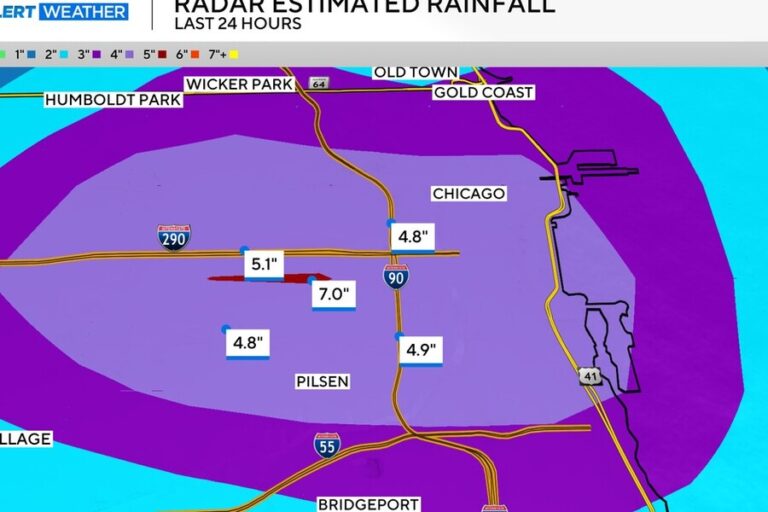A powerful and slow-moving storm system brought chaos to Chicago Tuesday night, unleashing torrential rain that triggered a Flash Flood Warning and severely disrupted life across the city. The West Side bore the brunt of the storm, with entire neighborhoods submerged, vehicles stranded beneath viaducts, and emergency responders conducting multiple water rescues. The National Weather Service issued a Flash Flood Warning just after 8 p.m., warning residents that low-lying areas and roadways were at immediate risk of flooding, and that warning proved all too accurate.
What began as a few isolated thunderstorms rapidly escalated into a dangerous and prolonged weather emergency. The rain started falling at a relentless pace of 1 to 2 inches per hour, overwhelming the city’s stormwater infrastructure. In under two hours, rainfall totals shattered expectations: the area near the United Center recorded more than five inches, while Douglass Park saw a staggering 6.6 inches.
In neighborhoods like Homan Square, Tri-Taylor, and Douglass Park, streets turned into rivers, basements filled with water, and residents watched helplessly as their homes and vehicles were engulfed. One of the most severely impacted corridors was along the Eisenhower Expressway, which saw multiple lane closures as floodwaters surged across the road. Officials from the Illinois Department of Transportation considered shutting down sections of the Dan Ryan Expressway between 18th and 31st streets due to dangerously high water levels.
The storm’s fury forced first responders into high gear. Chicago Fire Department crews were seen pulling people from flooded vehicles, including one dramatic rescue at the Metra viaduct at Western Avenue and Kinzie Street, where a person had to be saved from the roof of their car. Other rescues took place at intersections known for poor drainage, such as Ashland Avenue and Kinzie Street, and Western and Ogden avenues.
While the West Side experienced the most devastation, the storm also swept across other parts of the city. The North Side neighborhoods of Lincoln Park, Lakeview, North Center, and Edgewater were hit with heavy rain and gusting wind, but avoided the kind of severe flooding that paralyzed much of the West Side. Experts believe better drainage infrastructure and higher elevation helped prevent widespread damage in those areas.
The storm not only impacted infrastructure. Public events were also affected, including a Teddy Swims concert scheduled at Huntington Bank Pavilion. As the weather worsened, organizers evacuated the venue, sending concertgoers home and highlighting the wider disruption caused by the storm system.
This flood emergency brought renewed attention to Chicago’s vulnerability to extreme weather events—an issue becoming more urgent in the face of climate change. Scientists have warned that as global temperatures rise, storms like the one that struck Tuesday night will become more intense, more frequent, and more destructive. Urban areas with aging infrastructure are especially at risk. In Chicago, many neighborhoods rely on a combined sewer system that often cannot cope with sudden, intense rainfall, leading to dangerous flooding and sewer backups.
For many West Side residents, the storm was not just a natural disaster but a reminder of long-standing disparities. These neighborhoods are often underserved when it comes to infrastructure investments and climate resilience measures. Community leaders and advocacy groups are expected to demand answers from city officials about why their areas seem to suffer disproportionately during extreme weather events and what can be done to prevent it in the future.
City officials began assessing damage early Wednesday morning and urged residents to report flooding, structural damage, or any signs of electrical hazards. Cleanup crews were deployed across key areas to remove debris and inspect roadways. Engineers will be tasked with evaluating whether drainage systems failed and what improvements may be necessary to prevent a repeat of Tuesday’s devastation.
Authorities are also urging the public to remain cautious as additional rain is possible later in the week. With the ground already saturated, even modest rainfall could lead to renewed flooding. The National Weather Service continues to monitor conditions and may issue additional alerts.
Residents are being advised to avoid driving through flooded streets, check basements and electrical panels for water damage, and document any property losses for insurance purposes. Officials have also reminded the public not to underestimate the dangers of floodwaters, which can hide sinkholes, downed power lines, or debris.
For Chicagoans, especially those living in the West Side’s hardest-hit areas, the storm was a traumatic and costly reminder of how quickly nature can turn a routine evening into a full-blown emergency. As the city recovers and investigations begin into how well the infrastructure held up, one thing is clear: extreme weather preparedness is no longer optional. It’s a necessity.
Tuesday night’s flash flood will be remembered not only for the inches of water that fell but for the broader questions it raised about infrastructure, equity, and how cities like Chicago must adapt to a future of climate uncertainty. As the waters recede, many residents will be left cleaning up, demanding answers, and hoping for a city that’s better prepared the next time the skies open up.
